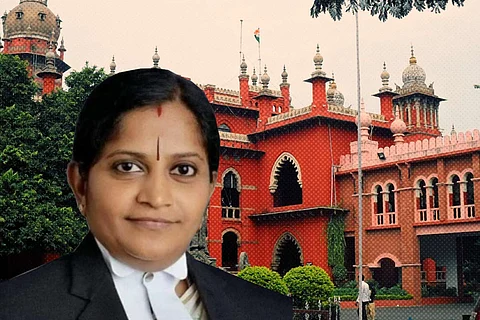

A day after the Union government appointed advocate Lekshmana Chandra Victoria Gowri as an additional judge of the Madras High Court, the Supreme Court upheld her appointment on February 7, Tuesday. Gowri’s appointment was challenged in the Supreme Court after she came under scrutiny for her alleged hate speeches against Muslims and Christians. A bench of Justices Sanjiv Khanna and BR Gavai heard and dismissed two petitions against Gowri’s appointment on Tuesday, February 7.
Major drama played out in the Madras High Court and Supreme Court as a bench of SC judges heard the petitions against her appointment just minutes before the swearing in ceremony. Even as the hearing in the Supreme Court was going on, Gowri was sworn in at around 10.45am.
At the hearing in court hall no 7 of the Supreme Court, Justice Khanna said that there is a difference between eligibility and suitability. “On eligibility, there could be a challenge. The courts should not get into suitability, or the whole process will go haywire,” he said. Senior advocate Raju Ramachandran who represented the petitioners who opposed the elevation pointed out that Victoria Gowri’s speeches and tweets expose her mindset. “It is not in tune with the Constitution, which is antithetical to Article 21,” he said.
Justice Gavai stated that he himself came from a political background which did not affect his work as a judge, Ramachandran too listed several judges such as Justices VR Krishna Iyer, KS Hegde and Aftab Alam who had various political affiliations. But Ramachandran argued that the question was not of political affiliation but of hate speech.
As Ramachandran argued that Gowri’s alleged hate speeches were “antithetical to the values of the Constitution”, Justice Khanna said, “That will be stretching too much.” Ramachandran then argued that the swearing-in cannot be allowed to continue when the Chief Justice of India has said that the collegium was looking into Gowri’s appointment. “It will be in deference to the collegium if it is stayed,” Ramachandran said.
On Monday, the apex court had advanced the hearing of the petition against Gowri’s elevation to Tuesday, with a bench headed by CJI Chandrachud saying that the collegium has taken note of “certain developments” after her name was recommended to the Union government. LiveLaw reported that the petitioners had sought early listing of their petitions on Tuesday morning so that they could be heard before Gowri’s swearing-in at the Madras High Court scheduled for 10.35 am.
The petition was originally listed before a bench of Justices Sanjiv Khanna and MM Sundresh. However, Justice Sundresh, who has previously served as a judge of the Madras High Court, appears to have recused himself from the hearing as he had been consulted by the collegium before Gowri’s recommendation. Journalist Saurav Das, who first reported on Gowri’s alleged hate speeches in Article 14, pointed out that Justice Sundresh was consulted by the collegium before Gowri’s recommendation. He questioned the propriety of the judge hearing a challenge against the recommendation made based on his own opinion.
Victoria Gowri, a lawyer from Nagercoil in Tamil Nadu, was one of the five advocates recommended for the elevation as the judges of the Madras High Court by the Supreme Court collegium on January 17. Gowri has also been the national general secretary of the Bharatiya Mahila Morcha, the women’s wing of the Bharatiya Janata Party (BJP). Days after the collegium’s recommendation, a report in Article 14 detailed several hate speeches allegedly made by Gowri against Christians and Muslims.
After the hate speeches came to light, a group of 21 advocates from the Madras High Court Bar Council sent representations urging President Droupadi Murmu and the Supreme Court Collegium to reconsider the decision to elevate Gowri as a judge. In their representation dated February 1, the protesting advocates said that the recommendation to elevate advocate Gowri “dents the independence of the judiciary”, and referred to two interviews given by Gowri where she made hate speeches against Muslims and Christians.
The petition challenging Gowri’s appointment was filed by three lawyers practising in the Madras High Court. The petition expresses concerns that Gowri had exhibited “strong prejudice” against citizens on the ground of their religious affiliation, according to Bar and Bench. The petition refers to an article by Gowri published in the RSS publication Organiser titled ‘Aggressive baptising destroying social harmony’, and an interview titled ‘More Threat to National Security & Peace? Jihad or Christian Missionary? – Answers Victoria Gowri’, and also her affiliation with the BJP, and the presumption that these alleged hate speeches were not placed before the Supreme Court and Madras High Court collegia before Gowri’s elevation was recommended.
There’s only one precedent so far of the Supreme Court quashing a High Court judge’s appointment on finding them ineligible before they were sworn in. This happened in 1992 when the Supreme Court quashed the appointment of KN Srivastava as a judge of the Gauhati High Court, and the case has been cited in the petition challenging Gowri’s appointment. In Srivastava’s case, the section of the bar had objected to his appointment citing corruption allegations, and on the grounds that he had never practiced as an advocate and never held a judicial office.
Srivastava was a secretary-level officer in the Mizoram law and judicial department and had been a member of certain tribunals and commissions in this capacity. While the Supreme Court did not consider the corruption allegations, it decided that the posts held by Srivastava were under the executive, and cannot be considered a judicial office, thereby finding him ineligible to be a High Court judge under Article 217 in The Constitution Of India. However, this case was before the collegium system of appointing judges was introduced in 1993.
Watch: Why the Modi government wants to change the collegium system | Let Me Explain